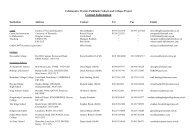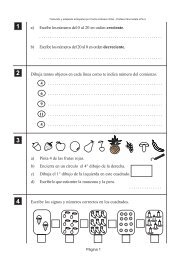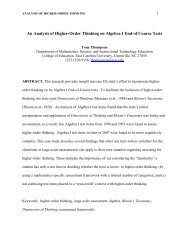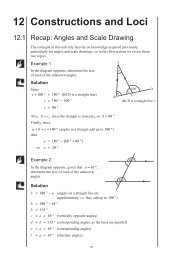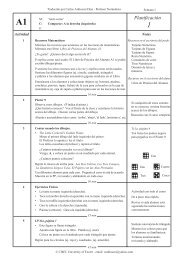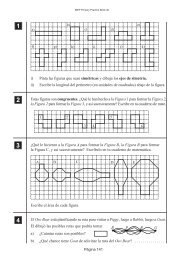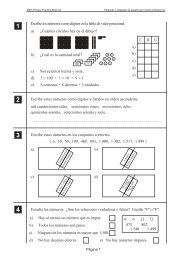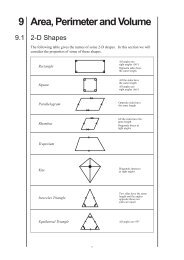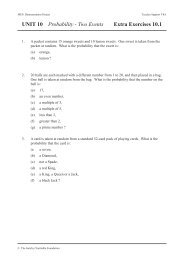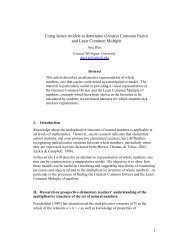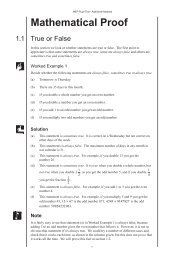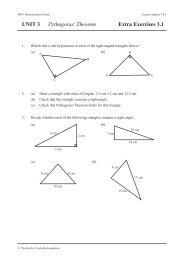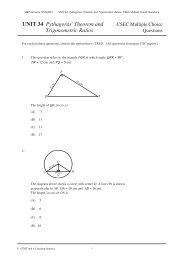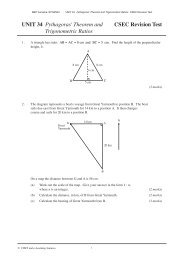It's CAME; We saw; Did it Conquer? – A review of the Cognitive ...
It's CAME; We saw; Did it Conquer? – A review of the Cognitive ...
It's CAME; We saw; Did it Conquer? – A review of the Cognitive ...
Create successful ePaper yourself
Turn your PDF publications into a flip-book with our unique Google optimized e-Paper software.
this teaching style. This pos<strong>it</strong>ive view <strong>of</strong> peer-tutoring was also reflected in <strong>the</strong> pupil<br />
evidence and both <strong>the</strong> survey and <strong>the</strong> pupil interviews suggested that <strong>the</strong> <strong>CAME</strong><br />
project may have a pos<strong>it</strong>ive influence in encouraging independent working. There<br />
was a statistically significant difference in <strong>the</strong> responses <strong>of</strong> pupils to <strong>the</strong> statement<br />
concerning <strong>the</strong> enjoyment <strong>of</strong> solving problems, w<strong>it</strong>h <strong>CAME</strong> pupils responding more<br />
pos<strong>it</strong>ively.<br />
In <strong>the</strong> view <strong>of</strong> <strong>the</strong> <strong>CAME</strong> teachers, <strong>the</strong> support programme was crucial to this project<br />
as on <strong>it</strong>s own <strong>the</strong> resource folder was intimidating. The demonstration lessons, while<br />
interesting and informative, were at times artificial. However, <strong>the</strong> mutual support<br />
given by <strong>the</strong> participating staff and <strong>the</strong> forum that <strong>the</strong> training days supplied to discuss<br />
difficulties, proved to be very beneficial and appreciated by all who attended.<br />
Broader Application<br />
While this research has highlighted a number <strong>of</strong> very specific issues associated w<strong>it</strong>h<br />
this particular programme <strong>it</strong> also raises a number if issues that are more general. In<br />
particular, <strong>it</strong> raises questions about <strong>the</strong> level and nature <strong>of</strong> integration <strong>of</strong> thinking<br />
skills and cogn<strong>it</strong>ive development into <strong>the</strong> curriculum and gives a glimpse <strong>of</strong> how this<br />
might successfully be accomplished. Certainly <strong>the</strong> ideas underpinning <strong>CAME</strong> can be<br />
heard resonating through <strong>the</strong> new curriculum in Nor<strong>the</strong>rn Ireland and elsewhere. The<br />
change in att<strong>it</strong>ude experienced by <strong>the</strong> pupils w<strong>it</strong>h particular regard to enjoyment <strong>of</strong><br />
problem solving, indicates <strong>the</strong> need for this type <strong>of</strong> work to become more widespread.<br />
In add<strong>it</strong>ion, this research brings to light some concerns about <strong>the</strong> nature <strong>of</strong> continuing<br />
development (CPD) for practising teachers and <strong>the</strong> fact that <strong>the</strong> teachers gained so<br />
much from <strong>the</strong> opportun<strong>it</strong>y to watch each o<strong>the</strong>r teach and discuss <strong>the</strong>ir experiences<br />
suggests that this type <strong>of</strong> CPD has some benef<strong>it</strong> regardless <strong>of</strong> <strong>the</strong> particular aim <strong>of</strong> <strong>the</strong><br />
teaching programme.<br />
- 17 -



